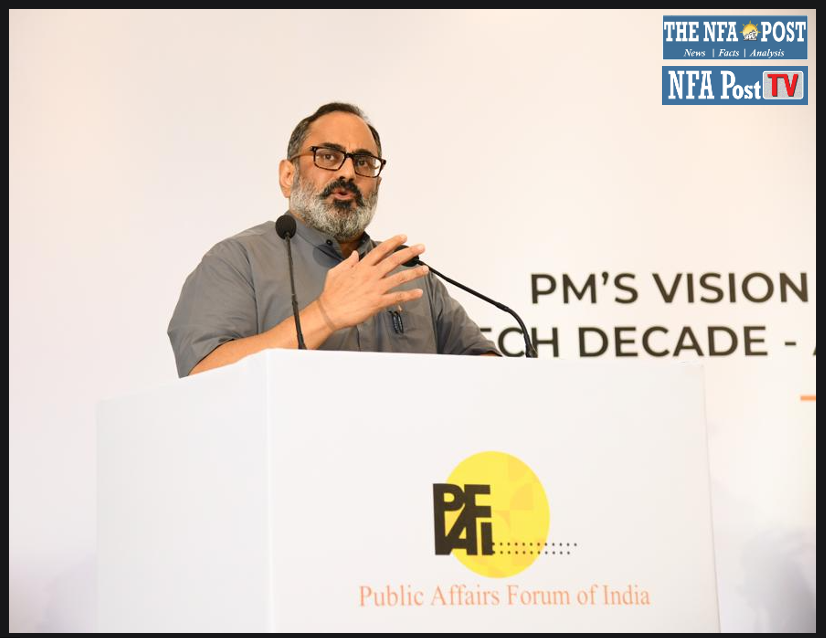Union Minister of State for Electronics and Information Technology Rajeev Chandrasekhar said Digital economy to be the biggest contributor with 20% of the GDP by 2025-26
Draft of the new Digital Act to be presented by the end of month
New Delhi, NFAPost: Speaking at the Public Affairs Forum of India’s (PAFI) Dialogue on the theme, ‘PM’s Vision for India’s Tech Decade – A Deep Dive’, Union Minister of State for Electronics and Information Technology Rajeev Chandrasekhar said Prime Minister envisions India to be among the top three economies in the world by 2026-27 and a large part of this growth expansion will come from digital.
“The digital economy will be the biggest contributor with 20% of the GDP by 2025-26. India hopes to achieve the $1 trillion digital economy landmark by 2025-2026. Digital Economy will also be a big part of catalysing the entrepreneurial culture in the country with more and more start-ups contributing to the economy,” said Union Minister of State for Electronics and Information Technology Rajeev Chandrasekhar.
He elaborated on the focus in the next ‘Techade’ where the Government aims to intensify, grow and accelerate the three pillars of Digital India established by the Honorable Prime Minister in 2015: a) Technology empowers and transforms people’s lives, b) Technology as a driver for the expansion of the economy and entrepreneurship, and c) The role of India in the future technology-dominated world, not just as consumers but as creators of technology.
Union Minister of State for Electronics and Information Technology Rajeev Chandrasekhar also addressed the current issues that the government is currently focussing including talent in the digital space.
“In the semiconductor space, in a span of 14 months we have not just created opportunities in manufacturing, design and innovation but also introduced a brand new curriculum that will be implemented in higher education systems that will deliver 85,000 highly qualified professionals. This will be a talent pool not only for the Indian semi-conductor and electronics ecosystem but also for the global ecosystems,” said the Minister.
Addressing the public policy professionals he stressed digitalisation of government and public services is accelerating even faster.
“We have created an awe-inspiring transformation of the process of the government. The G2C relationship has created more trust and transparency. We are embarking on a journey to be a global player in emerging technologies – AI, quantum computing, semi-conductor, etc. Several policies will be made by the government,” said Union Minister of State for Electronics and Information Technology Rajeev Chandrasekhar.
Union Minister of State for Electronics and Information Technology Rajeev Chandrasekhar sid PM’s wants these policies, laws, etc of global standards so that they are a catalyst to our ambitions.
“The public affairs professionals can play a role here by participating in the consultation process, which is being institutionalised now, with their thoughts, ideas, solutions and suggestions,” said Union Minister of State for Electronics and Information Technology Rajeev Chandrasekhar.
He urged the public policy practitioners to leave behind the concept of lobbying and help the government shape the ‘India Techade’.
PAFI President Virat Bhatia welcomed the Minister of State for Electronics and Information Technology and Skill Development and Entrepreneurship, Government of India and moderated the session. PAFI Vice-President Vinita Sethi shared the closing remarks.
About PAFI (Public Affairs Forum of India)
PAFI is dedicated to raise and maintain standards in Public Affairs to enable the profession to attain recognition and credibility by bringing in a paradigm shift in the way businesses engage with stakeholders – Government, Media, Civil Society and Academia. It also endeavors to deepen and broaden the talent pool to create young leaders from diverse backgrounds while planning to expand its footprint across India.
Since its inception in 2008, PAFI has been actively promoting and upholding transparency, probity, inclusion, and diversity across the wider remit of Public Affairs Profession Spanning Policy Advocacy, Government Relations, Corporate Communications and Corporate Social Responsibility.
It acts as a cross-sector networking platform for public affairs professionals and provides opportunities to benefit from interactions with one other as well as with key policymakers and influencers through evidence-based research, closed-door dialogues, interactive panel discussions, seminars, an Annual Lecture and the National Forum, its annual flagship event.
For more information, visit: www.pafi.in and Twitter: @PAFI_India





